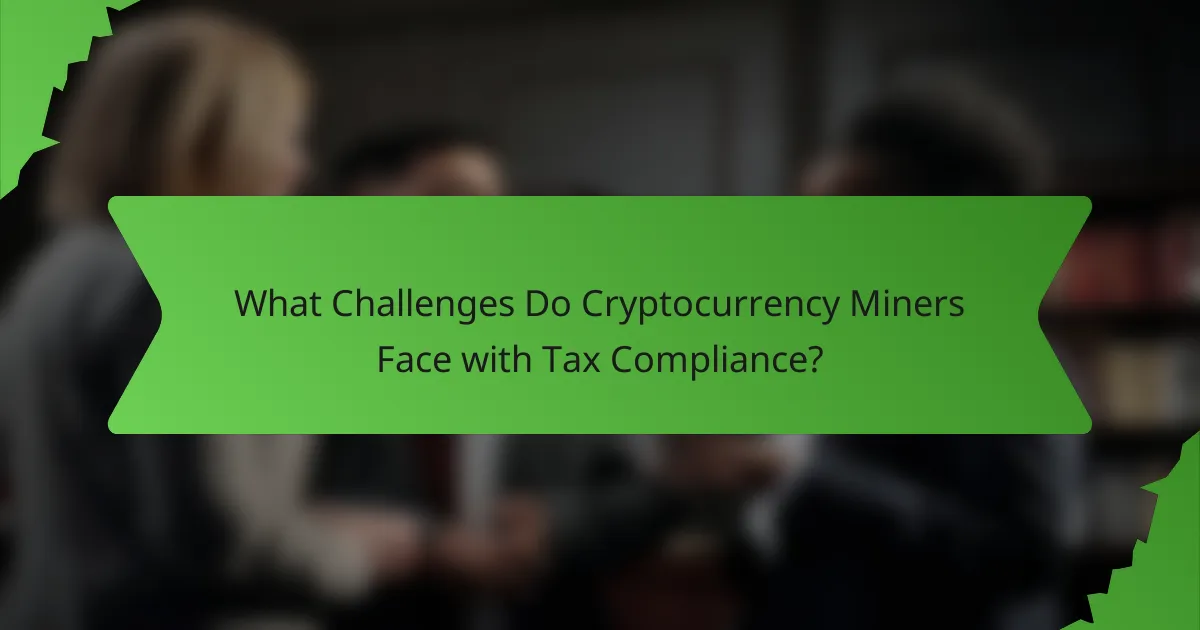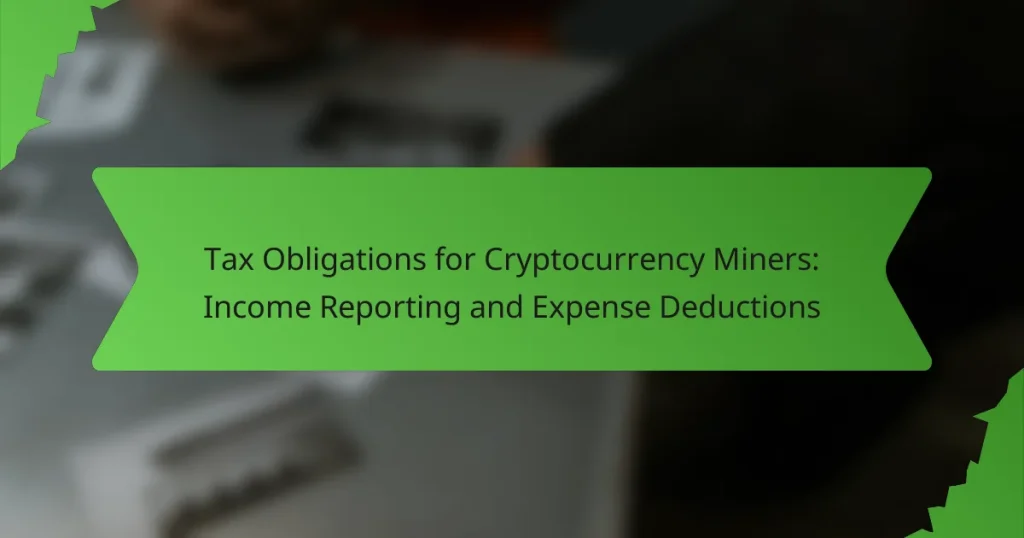Cryptocurrency miners are individuals or entities that validate transactions and create new coins in the digital currency ecosystem. They are required to report their earnings as taxable income, which is recognized at the fair market value of the mined cryptocurrency on the day it is received. Detailed record-keeping of mining activities is essential, including dates and amounts mined, as well as documentation of deductible expenses such as electricity costs, hardware depreciation, and maintenance fees. Tax compliance poses challenges due to unclear regulations, the volatility of cryptocurrency values, and varying local laws. Understanding these obligations is crucial for miners to avoid penalties and ensure accurate reporting of income and expenses.

What are the Tax Obligations for Cryptocurrency Miners?
Cryptocurrency miners are required to report their earnings as taxable income. This income is generally recognized at the fair market value of the mined cryptocurrency on the day it is received. Miners must also keep detailed records of their mining activities, including dates and amounts mined. Additionally, miners can deduct certain expenses related to mining, such as electricity costs and hardware depreciation. These deductions can reduce the overall taxable income. The IRS treats mined cryptocurrency as self-employment income, subjecting it to self-employment tax. Accurate reporting and record-keeping are crucial for compliance with tax obligations. Failure to report income or claim deductions properly can lead to penalties.
How is cryptocurrency mining classified for tax purposes?
Cryptocurrency mining is classified as a taxable activity for tax purposes. Miners must report the fair market value of the cryptocurrency at the time it is mined as income. This income is subject to ordinary income tax rates. Additionally, miners can deduct certain expenses related to their mining operations. These expenses may include hardware costs, electricity, and maintenance. The Internal Revenue Service (IRS) in the United States provides guidance on this classification. According to IRS Notice 2014-21, mined cryptocurrency is treated as property for tax purposes. This classification impacts how gains and losses are calculated when the mined cryptocurrency is sold or exchanged.
What determines the classification of mining income?
The classification of mining income is determined by the nature of the activities involved in cryptocurrency mining. Specifically, it depends on whether the mining is conducted as a business or as a hobby. If mining is performed with the intention of generating profit, it is classified as business income. Conversely, if the activity is not pursued with profit motives, it may be classified as hobby income.
Tax regulations, such as IRS guidelines, stipulate that business income is subject to self-employment tax, while hobby income is reported differently and may not incur the same tax obligations. For example, business expenses can be deducted from business income, whereas hobby expenses are limited to the income generated. This distinction is crucial for accurate income reporting and compliance with tax laws.
How does the classification affect tax reporting?
Classification of cryptocurrency impacts tax reporting significantly. Different classifications determine how income and expenses are treated. For instance, if classified as property, capital gains tax applies to profits. Conversely, if classified as currency, ordinary income tax rates may apply. This distinction affects reporting requirements and potential tax liabilities. Accurate classification ensures compliance with IRS regulations. Misclassification can lead to audits or penalties. Proper classification is essential for maximizing deductions and minimizing tax burdens.
What types of income must cryptocurrency miners report?
Cryptocurrency miners must report various types of income. This includes income from mining rewards, which is the cryptocurrency earned by solving complex mathematical problems. Additionally, miners must report any transaction fees received from validating transactions on the blockchain. If miners sell their mined cryptocurrency, the proceeds from those sales are also considered taxable income. The Internal Revenue Service (IRS) treats these earnings as ordinary income, requiring miners to report them on their tax returns. Accurate reporting is crucial to comply with tax regulations and avoid penalties.
What constitutes taxable income from mining activities?
Taxable income from mining activities includes the fair market value of cryptocurrency received as rewards. This value is determined at the time the cryptocurrency is mined. Additionally, any fees earned from mining services or transactions also contribute to taxable income. The IRS considers these earnings as ordinary income. Miners must report this income on their tax returns. Accurate record-keeping of the fair market value at the time of mining is essential. This ensures compliance with tax regulations.
Are there any exceptions or special considerations?
Yes, there are exceptions and special considerations for cryptocurrency miners regarding tax obligations. Miners may qualify for certain deductions under specific conditions. For instance, if mining occurs as a hobby rather than a business, different tax rules apply. The IRS distinguishes between hobby income and business income. Hobby income may not allow for expense deductions, while business income does. Additionally, miners operating as a sole proprietorship may benefit from self-employment tax considerations. Understanding the nature of the mining activity is crucial for accurate tax reporting. Taxpayers should consult tax professionals for personalized advice based on their circumstances.
How do cryptocurrency miners report their income?
Cryptocurrency miners report their income by declaring the fair market value of the mined coins at the time of receipt. Miners must track the amount of cryptocurrency mined and the date it was mined. This value is considered taxable income and should be reported on tax returns. Additionally, miners can deduct certain expenses related to mining, such as electricity and hardware costs. Accurate record-keeping is essential for compliance with tax regulations. The IRS treats mined cryptocurrency as ordinary income, making it subject to income tax. This reporting method aligns with IRS guidelines on cryptocurrency taxation.
What forms are required for income reporting?
The forms required for income reporting include Form 1040, Schedule 1, and Schedule C. Form 1040 is the individual income tax return used by taxpayers. Schedule 1 reports additional income and adjustments to income. Schedule C is used to report income or loss from a business, including cryptocurrency mining. These forms are essential for accurately reporting income earned from cryptocurrency activities. The IRS mandates these forms to ensure compliance with tax laws.
How do miners calculate their total income for tax purposes?
Miners calculate their total income for tax purposes by determining the fair market value of the cryptocurrency mined at the time of receipt. This value is recorded as income and is subject to taxation. Miners must also track any expenses related to mining operations, such as electricity costs and equipment purchases. These expenses can be deducted from the total income to arrive at the taxable income. The IRS classifies mining income as self-employment income, which requires reporting on Schedule C. Accurate record-keeping is essential for compliance and accurate tax reporting.

What are the Expense Deductions Available for Cryptocurrency Miners?
Cryptocurrency miners can deduct various expenses related to their mining activities. These deductions may include the cost of mining hardware and software. Miners can also deduct electricity costs incurred during the mining process. Additionally, expenses for internet access and other utilities are deductible. Miners may also write off maintenance and repair costs for their mining equipment. If they operate from a dedicated space, a portion of rent or mortgage interest can be deducted. Furthermore, miners can deduct professional fees associated with tax preparation and legal advice. These deductions help reduce taxable income, thus lowering overall tax liability.
What types of expenses can miners deduct?
Miners can deduct various expenses related to their mining activities. These expenses include equipment costs, such as mining rigs and hardware. They can also deduct electricity costs incurred during mining operations. Additionally, miners may deduct internet service fees necessary for their operations. Costs for software used in mining can also be claimed. Miners may include expenses for maintenance and repairs of their equipment. Furthermore, any fees paid to pools or exchanges can be deducted. Travel expenses related to mining activities may also qualify for deductions. All these deductions help reduce the overall taxable income for miners.
How do operational costs factor into expense deductions?
Operational costs are essential for determining expense deductions in tax reporting. These costs include expenses directly related to running a business, such as equipment, utilities, and labor. For cryptocurrency miners, these operational costs can significantly reduce taxable income. Miners can deduct costs incurred for electricity used in mining, hardware purchases, and maintenance. The IRS allows deductions for ordinary and necessary expenses incurred while conducting business. Accurate record-keeping of these expenses is crucial for substantiating claims during audits. By properly accounting for operational costs, miners can optimize their tax obligations effectively.
What equipment and software expenses are eligible for deduction?
Equipment and software expenses eligible for deduction include computers, mining rigs, and related hardware. Software expenses for cryptocurrency mining, such as mining software and operating systems, are also deductible. These items must be necessary for the mining process to qualify. According to IRS guidelines, expenses must be ordinary and necessary for business operations. The IRS allows deductions for depreciation on equipment over time. Additionally, expenses related to electricity and internet services can also be deducted. Proper documentation is essential to substantiate these deductions during tax filing.
How can miners substantiate their expense deductions?
Miners can substantiate their expense deductions by maintaining detailed records of all expenses incurred during mining activities. This includes documenting costs for hardware, software, electricity, and internet services. Receipts and invoices should be kept to validate these expenses. Additionally, miners should track the time spent on mining and related activities. Accurate record-keeping aligns with IRS guidelines, which require proof for claimed deductions. By providing clear and organized documentation, miners can effectively support their expense claims during tax filing.
What documentation is required for claiming deductions?
To claim deductions, cryptocurrency miners must provide specific documentation. This includes receipts for all expenses related to mining activities. Invoices for hardware and software purchases are also required. Additionally, miners should keep records of electricity bills used during mining. Bank statements showing transactions related to mining expenses must be provided. Documentation of any repairs or maintenance costs for mining equipment is necessary as well. Accurate record-keeping is crucial for substantiating claims during tax assessments.
How can miners track their expenses effectively?
Miners can track their expenses effectively by using accounting software specifically designed for cryptocurrency. This software allows for real-time tracking of transactions and expenses related to mining activities. Miners should categorize expenses such as electricity, hardware, and maintenance for better organization. Regularly updating records helps maintain accuracy over time. Utilizing spreadsheets can also simplify tracking by providing a visual representation of expenses. Keeping receipts and invoices is crucial for tax purposes and validation. Additionally, miners can consult with tax professionals to ensure compliance with reporting requirements. This comprehensive approach aids in effective expense management and accurate tax reporting.
Are there specific rules for home office deductions?
Yes, there are specific rules for home office deductions. The IRS requires that the space must be used exclusively and regularly for business purposes. The area claimed must be a dedicated workspace, not shared with personal use. There are two methods to calculate the deduction: the simplified method and the regular method. The simplified method allows a deduction of $5 per square foot, up to 300 square feet. The regular method requires tracking actual expenses, including utilities and rent, proportionate to the office space used for business. To qualify, the home office must be the principal place of business or a place where you meet clients. Documentation is essential to substantiate the claims made.
What qualifies as a home office for cryptocurrency miners?
A home office for cryptocurrency miners qualifies as a dedicated space within a residence used exclusively for mining activities. This space must be separate from personal living areas to meet IRS requirements. The area should be used regularly and exclusively for mining tasks. It can be a room or a portion of a room set up with necessary equipment. The IRS stipulates that the space should be the principal place of business for mining operations. Proof of this can include photographs, utility bills, or rental agreements showing the designated area. Additionally, miners must maintain records of expenses related to the home office to claim deductions accurately.
How can miners maximize their home office deductions?
Miners can maximize their home office deductions by accurately calculating and documenting their workspace expenses. They should identify the portion of their home used exclusively for mining activities. This includes measuring the square footage of the office space compared to the total home size. Miners can deduct a percentage of utilities, internet, and other related expenses based on this calculation.
Additionally, miners should track direct expenses related to their mining operations. This includes equipment depreciation, maintenance, and any renovations made to accommodate mining. Keeping detailed records of all expenses is crucial for substantiating claims during tax filing.
According to IRS guidelines, using the simplified method for home office deductions can also be beneficial. This method allows a deduction of $5 per square foot, up to a maximum of 300 square feet. By applying these strategies, miners can effectively maximize their home office deductions.

What Challenges Do Cryptocurrency Miners Face with Tax Compliance?
Cryptocurrency miners face significant challenges with tax compliance. One major issue is the lack of clear regulations. Tax authorities in many jurisdictions have not established comprehensive guidelines for reporting mining income. This ambiguity can lead to uncertainty about how to classify earnings. Additionally, miners must track various expenses related to mining operations. These include electricity costs, hardware purchases, and maintenance fees. Accurately documenting these expenses is crucial for proper deductions.
Another challenge is the volatility of cryptocurrency values. The fluctuating nature of digital currencies complicates income reporting. Miners need to determine the fair market value of mined coins at the time of receipt. This requires consistent record-keeping and valuation practices. Furthermore, the decentralized nature of cryptocurrencies can create difficulties in proving income sources. Miners may struggle to provide necessary documentation during audits.
Compliance with tax obligations also demands a thorough understanding of local laws. Different countries have varying tax treatments for cryptocurrency mining. Miners must stay informed about their specific jurisdiction’s requirements. Failing to comply can result in penalties and fines. Overall, the combination of regulatory uncertainty, expense tracking, and income valuation presents significant hurdles for cryptocurrency miners in meeting their tax obligations.
What common mistakes do miners make in tax reporting?
Miners commonly make several mistakes in tax reporting. One frequent error is failing to report all income generated from mining activities. This includes not accounting for the fair market value of mined coins at the time of receipt. Another mistake is misclassifying expenses. Miners often do not distinguish between personal and business expenses, leading to inaccurate deductions. Additionally, some miners neglect to keep thorough records of their transactions. This lack of documentation can complicate tax filings and lead to discrepancies. Lastly, many miners are unaware of the specific tax obligations related to cryptocurrency, such as capital gains taxes when coins are sold. These mistakes can result in penalties or audits from tax authorities.
How can miners avoid errors in income reporting?
Miners can avoid errors in income reporting by maintaining accurate records of all transactions. This includes documenting the date, amount, and value of mined cryptocurrency at the time of receipt. Using accounting software specifically designed for cryptocurrency can help automate this process. Regularly reconciling records with exchange data ensures consistency and accuracy. Additionally, miners should stay informed about tax regulations related to cryptocurrency, as laws can change frequently. Consulting with a tax professional experienced in cryptocurrency can provide further guidance and help prevent mistakes.
What pitfalls should miners be aware of regarding deductions?
Miners should be aware of several pitfalls regarding deductions. One major pitfall is failing to keep accurate records of expenses. Without proper documentation, miners may struggle to substantiate their deductions during audits. Another pitfall is misunderstanding which expenses are deductible. For instance, personal expenses cannot be claimed as business deductions. Additionally, miners often overlook depreciation on mining equipment, which can significantly reduce taxable income. Furthermore, not considering the impact of cryptocurrency price fluctuations on reported income can lead to miscalculations. Lastly, miners should be cautious about mixing personal and business accounts, as this can complicate the deduction process. Each of these pitfalls can lead to potential tax liabilities or penalties.
How can cryptocurrency miners stay informed about tax regulations?
Cryptocurrency miners can stay informed about tax regulations by following updates from the IRS and other tax authorities. They should regularly check official websites for guidance and announcements. Subscribing to newsletters from tax professionals specializing in cryptocurrency is also beneficial. Joining online forums and communities focused on cryptocurrency can provide insights from peers. Attending workshops or webinars hosted by tax experts can enhance understanding. Utilizing tax software designed for cryptocurrency can ensure compliance with reporting requirements. Staying updated on changes in legislation is crucial, as tax laws evolve frequently.
What resources are available for tax guidance?
Resources available for tax guidance include the IRS website, tax preparation software, and professional tax advisors. The IRS provides comprehensive information on tax obligations through publications and forms. Tax preparation software often includes guidance specific to cryptocurrency transactions. Professional tax advisors can offer personalized advice based on individual circumstances. These resources help ensure compliance with tax laws and optimize reporting for cryptocurrency miners.
How often do tax regulations change for cryptocurrency activities?
Tax regulations for cryptocurrency activities change frequently. Changes can occur as often as several times a year. Regulatory bodies are adapting to the rapidly evolving cryptocurrency landscape. For example, the IRS updated its guidelines in 2021 to clarify reporting requirements. Similar updates have been made by other countries’ tax authorities. These changes often reflect new technologies and market practices. Staying informed is crucial for compliance. Tax professionals recommend monitoring updates regularly.
What best practices should miners follow for tax compliance?
Miners should maintain accurate records of all transactions and income. This includes tracking the fair market value of mined cryptocurrencies at the time of receipt. They must report all income on their tax returns, including mining rewards and any trading profits. Miners should also document all expenses related to mining operations. This includes hardware costs, electricity, and other operational expenses. Keeping receipts and invoices is essential for substantiating deductions. It is advisable to consult a tax professional familiar with cryptocurrency regulations. This ensures compliance with current tax laws and regulations. Following these best practices helps minimize the risk of audits and penalties.
How can miners prepare for tax season effectively?
Miners can prepare for tax season effectively by maintaining detailed records of their mining activities. This includes tracking the dates and amounts of cryptocurrency mined. Miners should also document expenses related to mining equipment and electricity costs. Accurate records help in reporting income and claiming deductions. Additionally, miners should familiarize themselves with tax regulations specific to cryptocurrency. The IRS treats mined cryptocurrency as income, which is taxable. Keeping updated on changes in tax laws is crucial for compliance. Miners may also consider consulting a tax professional for guidance tailored to their situation.
What tools can assist miners in managing their tax obligations?
Tax software can assist miners in managing their tax obligations. Tools like TurboTax and H&R Block provide specific features for cryptocurrency reporting. These platforms help users calculate capital gains and losses from mining activities. They also offer expense tracking features to deduct mining-related costs. Additionally, specialized software like CoinTracking and CryptoTrader.Tax simplifies reporting for multiple transactions. These tools integrate with wallets and exchanges for accurate data import. Miners can ensure compliance with IRS regulations using these resources. Overall, utilizing these tools streamlines the tax preparation process for cryptocurrency miners.
The main entity of this article is cryptocurrency miners and their tax obligations. The article provides a detailed overview of the income reporting requirements and expense deductions applicable to cryptocurrency miners, highlighting the classification of mining income, types of taxable income, and necessary documentation. It addresses common challenges faced by miners, including regulatory uncertainty and the need for accurate record-keeping. Additionally, the article outlines best practices for tax compliance, including tools and resources available to assist miners in managing their tax obligations effectively.




